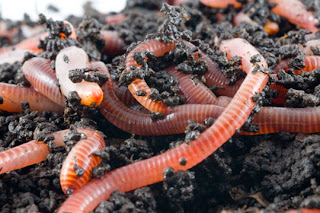(As always, if you are pressed for time, scroll down to the WHAT CAN YOU DO section.)
I was at a volunteer training session a number of months ago when the Executive Director made a rather startling announcement. He was quite upset that people had been mixing up their compostable and non-compostable 'garbage' when throwing it out. He explained that as the office actively composted, and had a worm farm to help them do this, that it drove him nuts when compost was wasted. As I had always heard that worm farms were smelly, messy things, I was quite surprised.
Now, by now you must have all at least heard of compost as a fertilizer and natural pesticide, as well as a great way of recycling and reducing waste. (By the way, if you want to be informed as well as mildly grossed out, click on the compost link and read about the use of human urine.) What I hadn't realized until I was exposed to it is that composting can be done in a very small space,
with very little fuss, and no smell. Until then, my experience with composting was based on huge containers set up in backyards, with plenty of space between the composting bin and the house (because these bins were rather smelly).
These small vermicompost bins (vermicompost is the use of worms to help with composting) are so popular that vermiculture (worm farming) has become big business. You can buy worms (and various paraphanelia) online, you can join online communities of vermiculturists, you can find numerous support sites with detailed instructions on how you can start your own 'worm farm' (here, here, or here).
You can find blogs devoted to vermiculture or vermicomposting (here and here), as well as reviews of these blogs.
Vermiculture has become so popular among grassroots 'culture that the dorms at Harvard University now have worm bins, there are sites which provide instructions for school projects using worms, and even initiatives for use of vermiculture/vermicompost as sustainable (and environmentally benifitial) business opportunity in the underdevelloping world.
To sum up, don't be suprised if you start hearing about worm farming, vermicomposting, and/or vermiculture a lot more.
WHAT YOU CAN DO
1. Do a bit of research, and consider starting your own worm farm
2. If you don't want a worm farm at home, start one in your office
3. If for some reason you can't start one in your office, see if you have a neighbour with the space and desire to have one, and save your compostable items to contribute to that worm farm
4. Donate some money to one of the organisations sponsoring vermiculture as a business opportunity in underdevelloping countries
5. Learn about the subject and do some workshops in community groups or schools, spreading the word.




